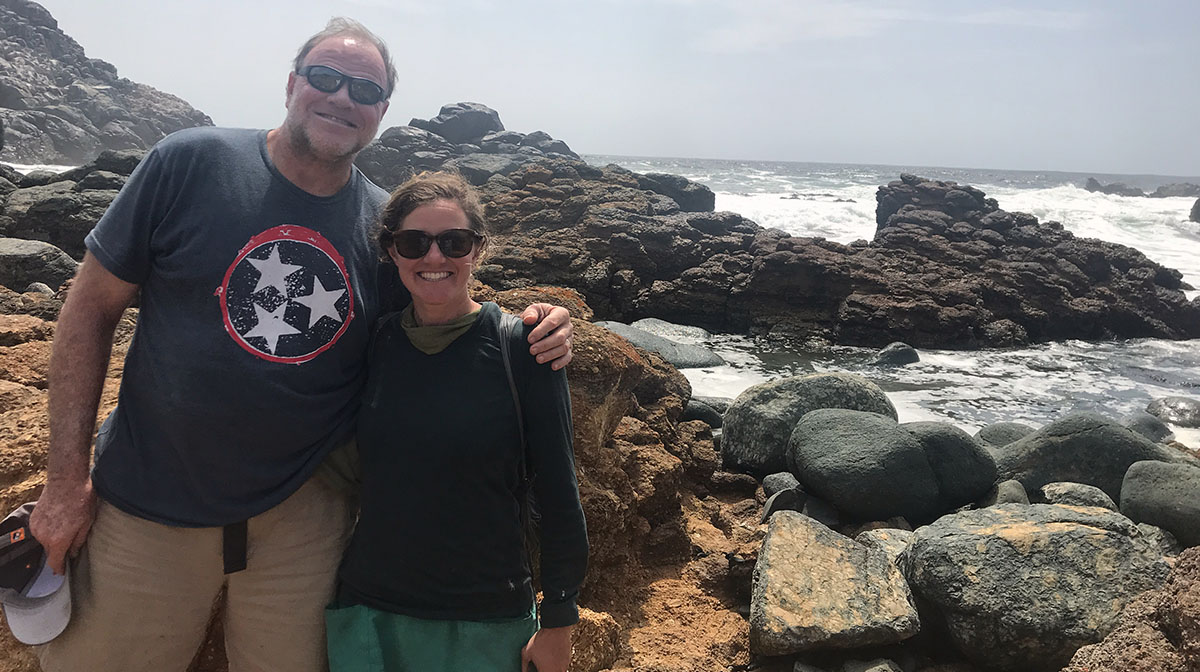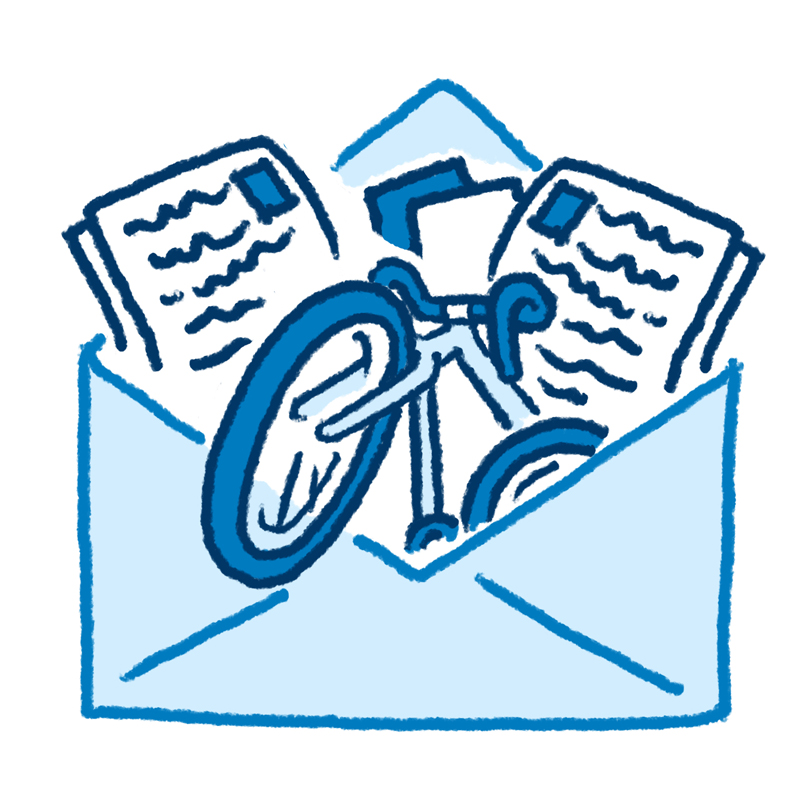Raising Up Dad
“Well, now I can say I’ve done it,” he said as he squeezed out of the borrowed, narrow one-person tent. At age 63, it was my dad’s first time camping — and his first bike tour. I had planned our route through remote northern Chile according to motel and hostel locations because he emphatically said he did not want to camp. We brought gear for him just in case, and one evening, after finding no vacancies, he agreed to go for it.
My dad’s personality cannot be accurately described without a tribute to his size. On this trip, you saw a six-foot five-inch 240-pound man squeezing into an airline seat en route to Chile, asking the flight attendant if maybe she had more cookies. He apologized for not speaking Spanish but uttered “gracias,” multiple times as she brought him cookies on a napkin, pronouncing it “gray-see-ose” so earnestly that everyone just smiled and nodded at him. He quietly told the people in the seats next to him how excited he was to be heading to La Serena to bike down the coast with his daughter for a whole week. He asked if they wanted to see photos of her. I sat a few rows away and pretended I didn’t know him. It’s hard to imagine this person who gave me half my genes any other way — overly enthusiastic, overly proud, and incredibly lovable.
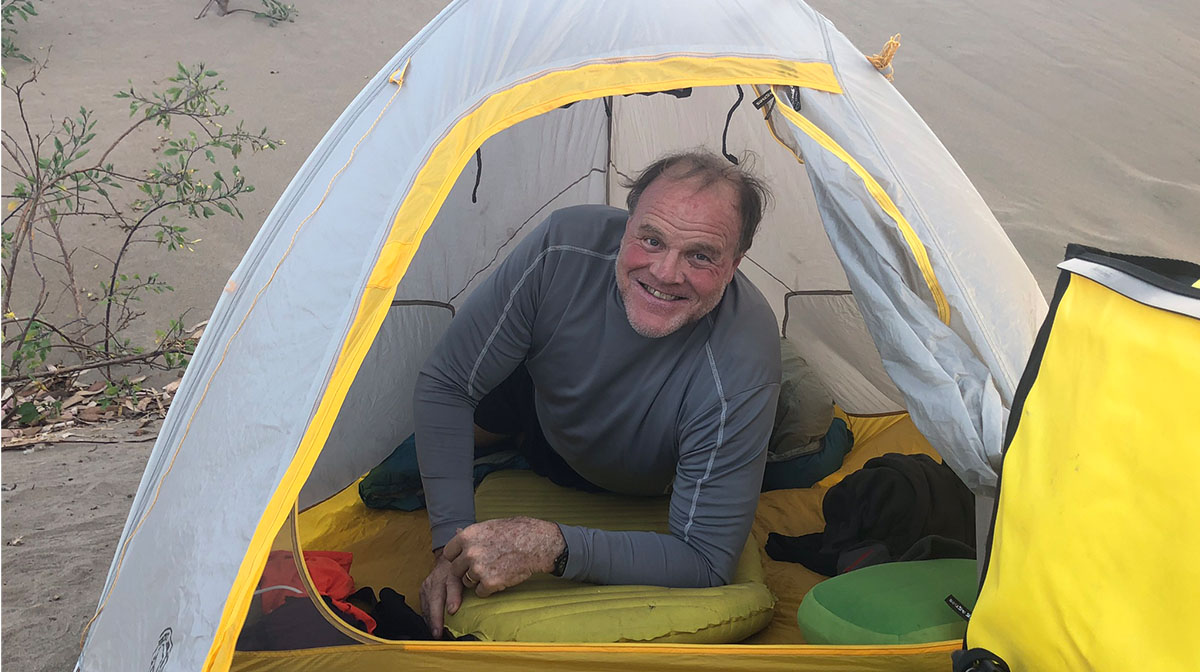
He told everyone that I was a “world-class cyclist,” to the degree that people believed I was a professional cyclist. I had to awkwardly, embarrassingly explain that I am in no way a professional cyclist but rather attempting to bike tour around the world, resuming my trip after a brief holiday hiatus.
We stayed at a gorgeous hostel with a courtyard, taking a day to situate our setups. Dad was so eager that I had to send him out to ride around on his own while I gathered his gear together. He wore loose basketball shorts over his spandex, donned tennis shoes, and brought entirely too many pairs of socks. He alternated between two synthetic orange T-shirts so that it looked like he always wore the same clothes. The next day, we took off and pedaled through Ovalle, Socos, Costa del Viento, and Huentelauquén. From there, we planned to continue south through Los Vilos, Pichidangui, Papudo, and end our time together in Valparaiso. A consistent but flat, bike-path kind of cyclist, I hoped Dad could make the miles. There was no plan B.
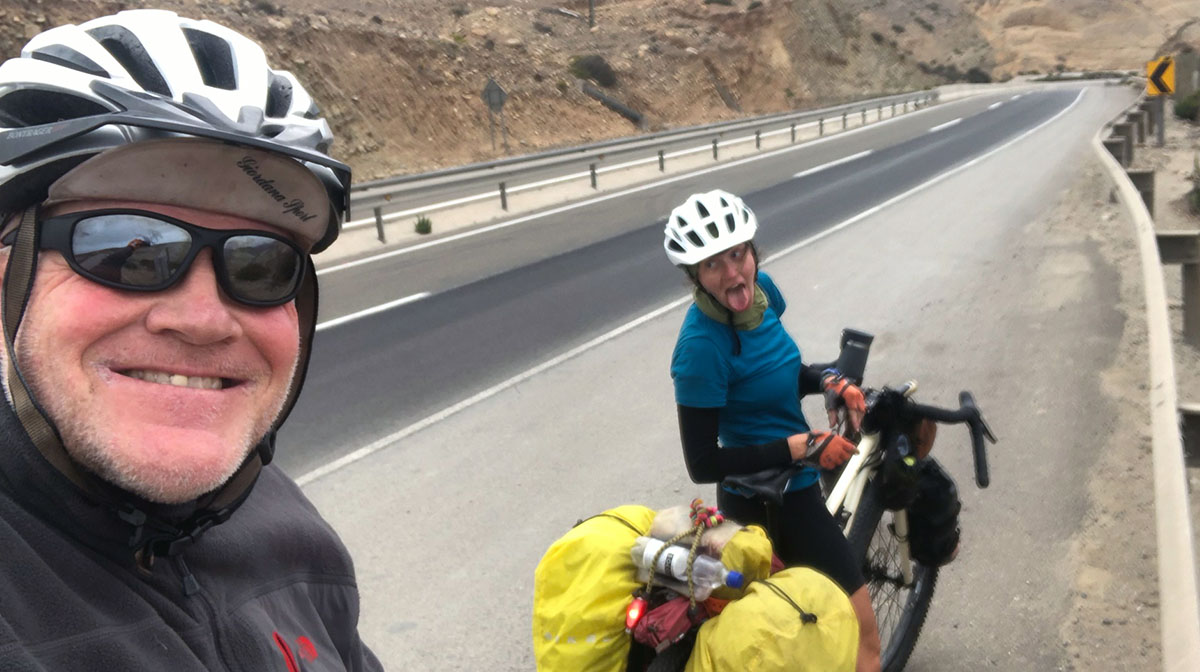
We got into a routine of leaving early every morning to beat the afternoon headwinds, riding about 40 miles through amber, cinnamon, chicory-colored desert hills, and adopting the Chilean schedule of eating a big lunch, followed by small dinner dishes called onces. The best way to keep Dad happy was to make sure the food was tasty, the portions adequate, and if there were mashed potatoes, pure de papa, on the menu, we were good to go.
As we pedaled south on highways and backroads, we saw hills stretch before us like a lackluster ribbon. Each paved, gray lump was a promise of pain resembling spent tea bags, lifeless and unenthusiastic. However, lack of enthusiasm is not something my father struggles with. Every hill was an “epic mountain,” and every big lunch, once, or roadside empanada was the “best meal ever!” Each day was the “best day ever,” and this was the “best trip ever!” Over several evening beers, which he called “pain helpers,” he confided that this is the longest vacation he’d taken since before I was born 33 years prior: 10 days, which we stretched to 14 after changing his return flight.
Outside of Huentelauquen, I watched my dad clench and unclench his fists as he stared at the Pacific Ocean and the green-brown seaweed surrounding us on the beach. We were on the lee side of a massive sand dune, watching the clouds move rapidly overhead and preparing to camp for the night. Along with his first time camping, he experienced a few other firsts the previous week: his first beard, his first time hand-washing clothes, and his first time trying to speak Spanish. I was proud of him. But it was in this moment by the ocean that I felt the tide shift — literally, figuratively, metaphorically, generationally. I saw his ruddy, red, freckled skin move with deep breaths after a year of hardships on several fronts. His massive shoulders relaxed, if only for a moment. I saw the moments ahead of us and behind us — when he taught me to play soccer, baseball, volleyball, and football. And now it shifted. I got to show him the world, one pedal stroke at a time. I was suddenly aware of the ability, maybe even responsibility, I had to open his eyes to different ways of life and to places and people he wouldn’t have otherwise known.
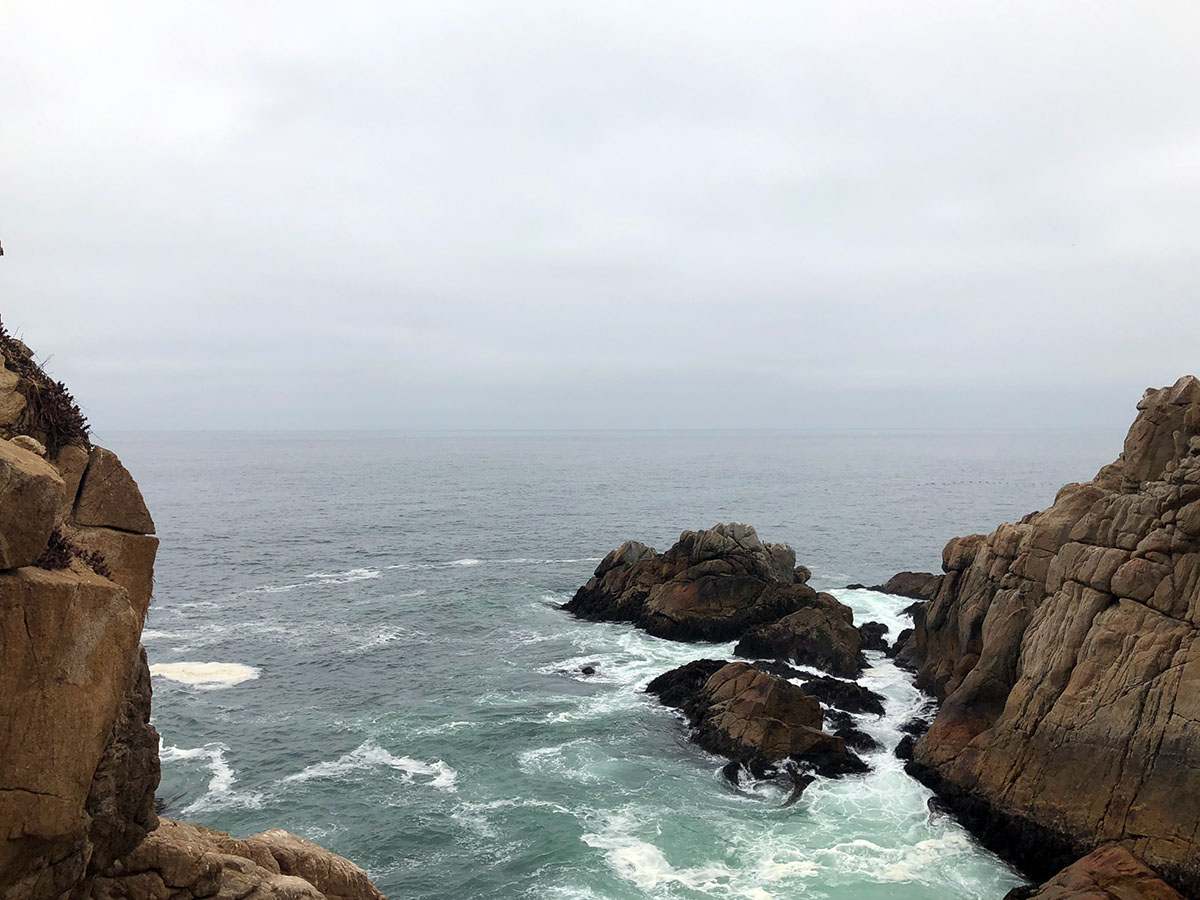
We continued our early starts, eating cold empanadas for breakfast, and I occasionally felt bad that Dad joined me for a section with so much traffic and hills. He never complained though, not even once. Not when we had cramped rooms, long miles, or no AC. Not even when the corn seller outside our hotel was hawking his wares at 10:30 PM. Dad was sweating, despite the fan pointed directly at him, and sighed, “Good night,” as his huge feet hung off the twin bed.
We stayed at a historic hot springs resort near Socos and in cabanas across the valley from wind turbines in Costa del Viento. Exploring tide pools and Chilean lagers on the Pichindigui peninsula, we patched Dad’s tubes so many times that there were patches on top of the patches. In Papudo, we stayed at a bed and breakfast where Dad was nervous about the shared bathroom but it ended up being his favorite place. Its historic restoration, tall ceilings, and opera music quickly won him over. The owner had to kindly tell him that the bath robes were hers and not for guests, but after that, she liked us so much that she asked us to stay longer and insisted on taking photos with us.
After 300 miles of apologizing to smiling shopkeepers and hotel owners for my Dad’s innocent missteps, we pulled into Valparaiso via broken sidewalks and bright graffiti. I had been terrified that something bad might happen to him, but we made it. We celebrated by drinking whiskey and eating cookies on the rooftop of our rented apartment, overlooking the bay. In the two days we had before his flight home, at Dad’s insistence, we hiked almost every staircase and alleyway in the city. He wanted to see it all and asked me questions about the huge murals, street art, and history like I was a tour guide. Ever curious, ever eager.
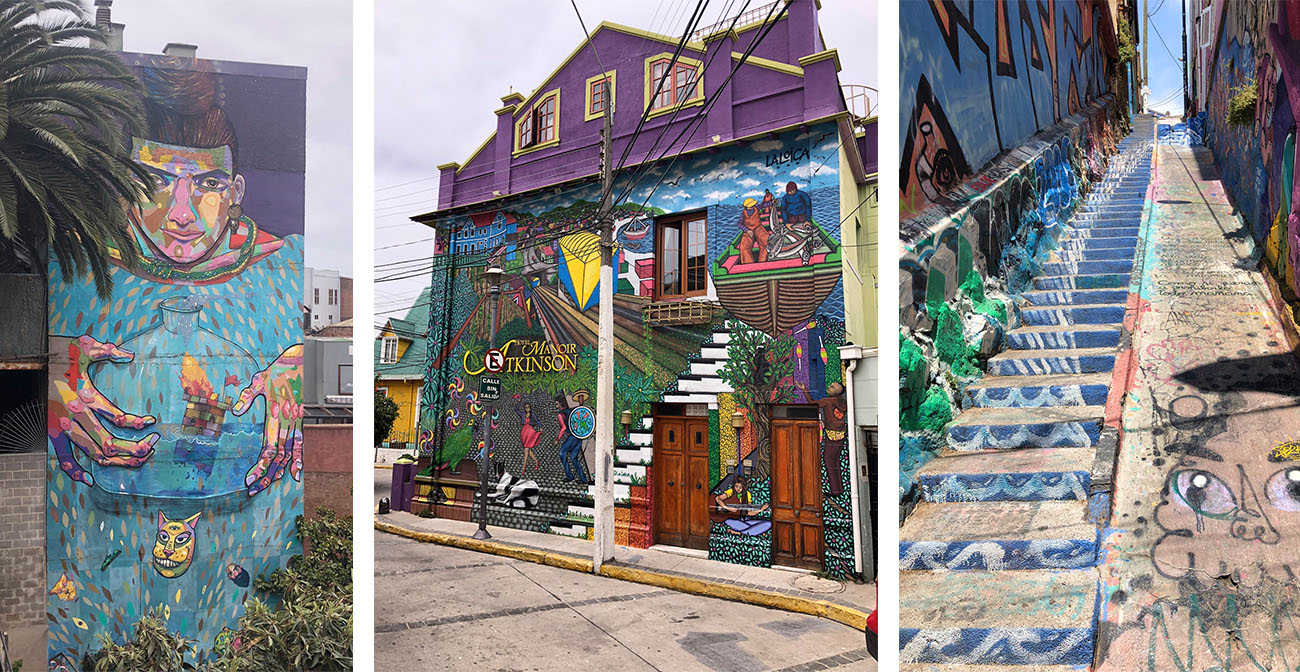
The bus came to take him from the chaotic, dusty station to Santiago for his flight back to the U.S., and I felt like I was sending my kid off to school. I wrote down a few helpful phrases in Spanish, reminded him to be spatially aware (i.e., not knock down any tiny Chilean grandmas), and wished him luck as the bus pulled away. I thought of all the times Dad had put me first, and how when I was in college, he chose to bike and canoe with me instead of watching his beloved football team play in the stadium. That might have been when we really started to become friends — when he came to my level, wherever that was floating. I sometimes summoned his image in my mind at the top of climbs in the Andes, cheering me on. That image alone often kept me from walking my bike. Through the bus’s sweltering, black exhaust, we both wiped tears as we waved goodbye.
Fathers come in all shapes and sizes, and regardless of family dimensions, the adult figures we look up to as kids eventually morph into people who are closer to our equals. My father will always be a hero without a cape to me, but I know that as time goes on, there will be more opportunities for me to be the adult. I can’t wait to open his mind and show him more places, hopefully by bike, knowing that his ever-curious, ever-energetic spirit will be open to it.
Later that day, he texted that he was safely waiting at his gate at the Santiago airport, and I was relieved. He then sent me a picture of the cookie he was eating. I blamed him for my sweet tooth and responded with a picture of my ice cream cone.
